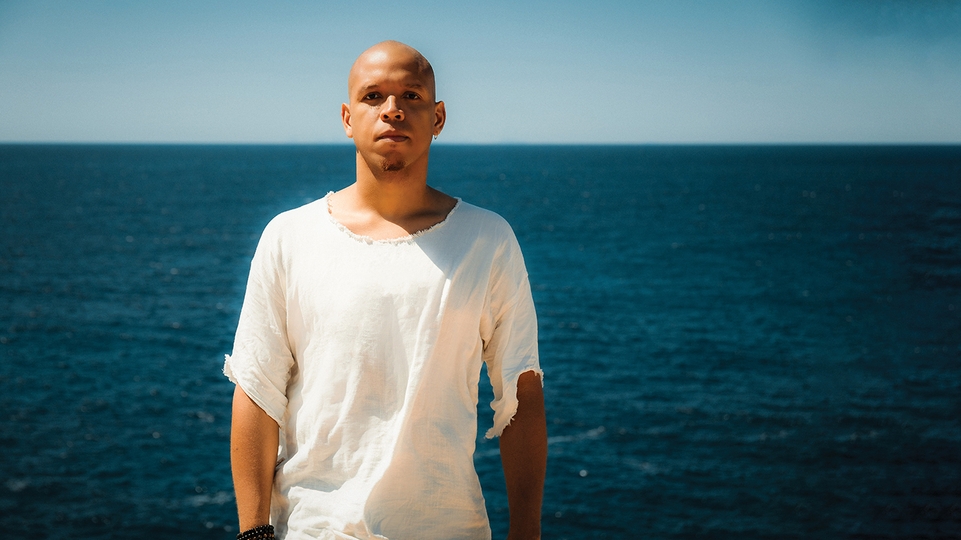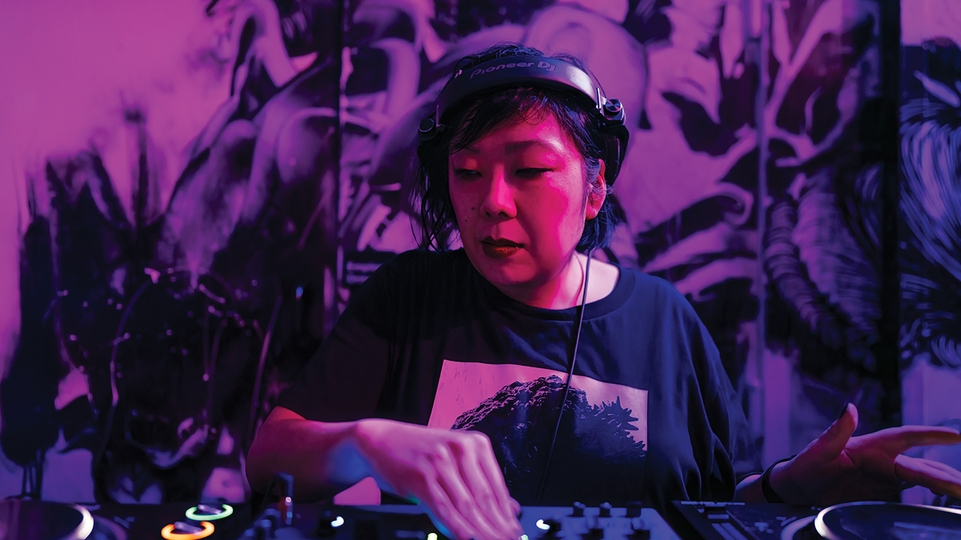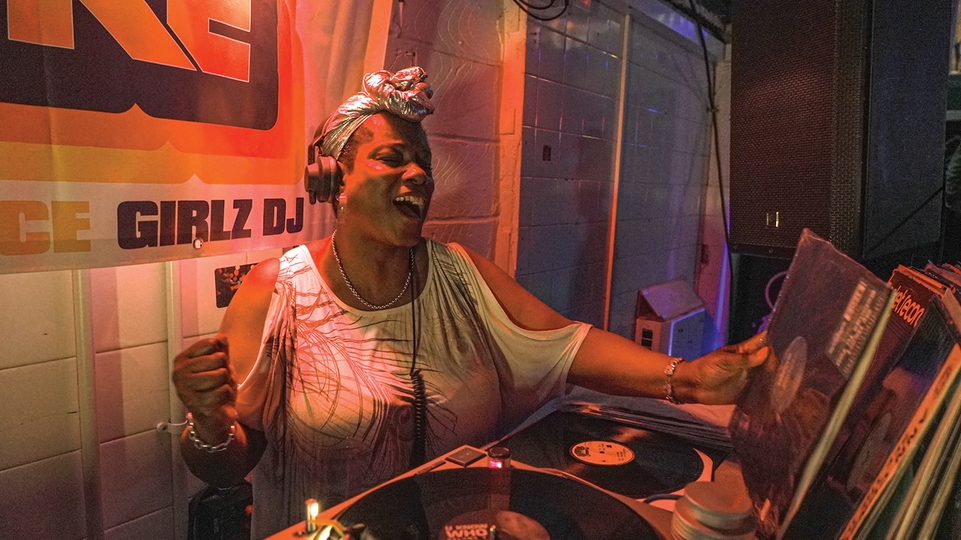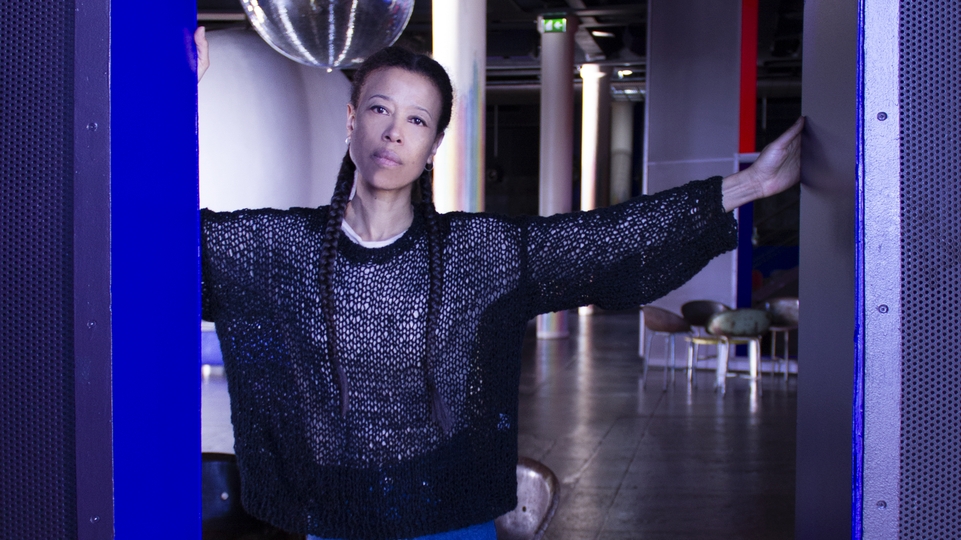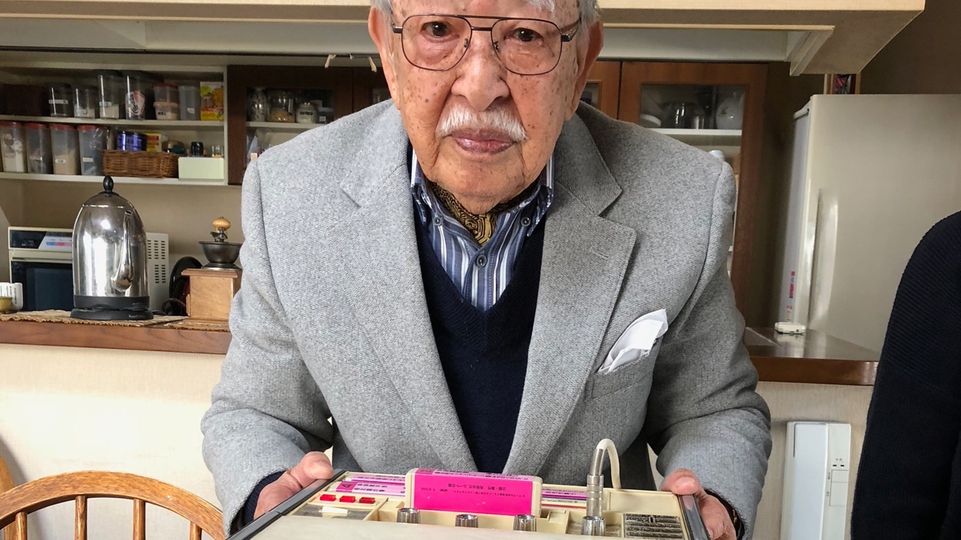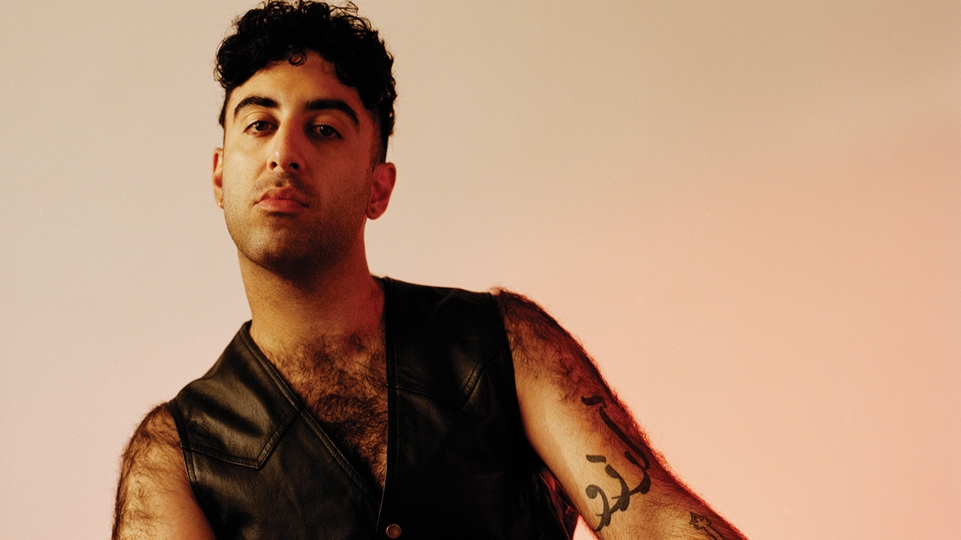
On Cue: DJ Nobu’s techno punk spirit
Over the past two decades, DJ Nobu’s name has become synonymous with Japanese techno; his deep yet hard-hitting sets consistently transfix the global underground. Alongside a blazing On Cue mix, the Bitta label boss tells James Gui about the lasting influence of his hardcore punk background, his Omega Point noise project, Future Terror parties, and inspiring the next generation of artists to lead with compassion
Everything about the scene is overwhelming: blinding strobes, blistering hiss, an onslaught of sub-bass and breakbeats coming down in torrents. The conductors of this electronic noise orchestra are Japanese techno luminary DJ Nobu and Fukuoka-based sound artist Doltz, the newest arrival on Nobu’s Bitta imprint. The duo twist, twiddle and convulse amid a mess of wires for a whirlwind 30-minute set. Combining Doltz’s modular manipulations with Nobu’s analogue touchplate synth work, their cacophonous debut performance as Omega Point fits right in at 2024’s FORTUNA festival in Tokyo, which also features the likes of cyber-hardcore duo BBBBBBB and grindcore band BLACK GANION.
The displays of sonic overload across the three stages at Daikanyama’s UNIT venue are a far cry from the deep, psychedelic techno fare that Bitta is best known for, and even further from the scene DJ Mag is met with when we speak to Nobu over a video call one morning in March. The Chiba-born DJ is enjoying a rare period of downtime between tours, and he’s relishing the chance to spend a quiet spell in his hometown studio and his Tokyo apartment. “Coming back from tour, having a normal lifestyle is precious for me,” he says. “That’s why I like cooking, or cleaning. I listen to Billie Holiday and Bill Evans when I am at home, doing housework and interacting with my cat.”
When he’s not in the kitchen preparing his go-to dish — “creamed stew with salmon and spinach” — Nobu is most often found behind the decks at some of the global underground’s favourite clubs. He pretty much always plays Berghain during his stopovers in Berlin, save for the occasional night at Tresor; over the past few months he’s graced stages from London’s fabric to Beijing’s Zhao Dai and New York’s buzzworthy new queer rave, MERGE.
Although Nobu’s style is far from “fixed”, his fabled DJ sets have made his name synonymous with Japanese techno. Fans might be tempted to ask then, what was he doing at an extreme music festival hosted by Tokyo noise group ENDON?
But really, this is who Nobu has been all along. “Both Doltz and I come from a hardcore punk background, and we wanted to go back to our roots,” he wrote in an Instagram post after the show. “The thrill of a very physical session with a partner and the unrestricted passion was great — different from techno,” he says now. “It reminded me of when I was in a band.”
It’s a story he’s told in numerous interviews in the past: after picking up a guitar at 15, Nobu’s first musical forays were in Chiba’s punk scene, before he turned to DJing everything from dub and hip-hop to thrash metal, influenced by the city’s anything-goes warehouse parties. Taught by local skaters and crate diggers like DJ Shinsaku, Nobu’s initial efforts were rough and full of genre-defying grit. “My role model is a guy called Nori, [the] bassist of the hardcore bands Nightmare and Life,” he says. The alliance of hardcore punk music with progressive politics — of “standing up for the socially disadvantaged” — was crucial to his initial fascination with the scene during his teenage years, he adds.
Later, formative experiences at Berlin’s Love Parade and the legendary 1994 Liquidroom Tokyo set by Jeff Mills instilled in him a lifelong love for techno. “The first time I heard techno, the impact and passion were similar to the first time I heard hardcore punk,” he remembers.
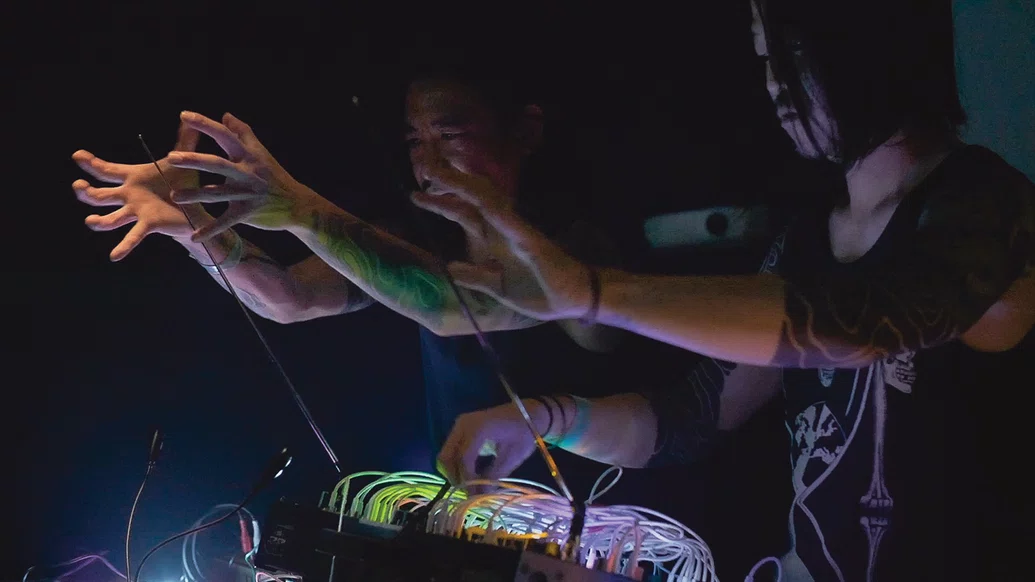
Nobu’s earliest efforts at techno production were executed with a similarly punk attitude. Though he might be embarrassed if you bring it up now, in 1999, he debuted on a split EP with UK duo 2CB (AKA Subhead), contributing a track called ‘Speak English or Die’ — a clever reappropriation of Stormtroopers of Death’s xenophobic thrash track of the same name. Armed with an S3000 sampler with which he mined sounds from a copy of Street Fighter 2 and a Pan Sonic record, Nobu crafted a hypnotic distorted groove peppered with tittering bleeps that cut through the noise.
In the two decades since, Nobu has released tracks and EPs on Tikita, Semantica and Non Series, his sound constantly expanding the rhythmic limits of minimal and ambient techno. ‘Zzzz’ from his 2019 EP, ‘ON-Netoh’, did away with beats altogether; over its 14-minute sprawl, metallic chimes resonate above aquatic gurgles. His eclectic DJ sets have always been his strongest suit, from deep yet hard-hitting festival slots at Dekmantel and Terraforma to the ascendant house selections he made for Rainbow Disco Club in 2023. His mix for DJ Mag’s On Cue series is a headrush of peak-time techno energy.
But even as his influences and techniques have morphed and evolved over the years, Nobu’s punk spirit has always remained. So when ENDON hit him up to play at FORTUNA, the request wasn’t entirely out of left field. In fact, he saw it as an “opportunity to break the entrenched notions of the Japanese techno scene” and “to express myself freely and in the hardcore way that I had been looking for”. Having first practised together only four days before the performance due to their busy tour schedules, he and Doltz bridged the perceived gap between the noise and club scenes in a way that only they could. Screaming into the piezo microphone attached to his SOMA LABORATORY ENNER synth, Nobu felt like he “were a musical instrument myself, like a human being could take the place of the cables of a modular synth".
The Omega Point set reflected a mission that Nobu’s been pursuing through his own event series, Future Terror, for years. Launched back in 2001, the party became a mainstay of Chiba’s underground scene, in spite of the inevitable difficulties that come with starting something new in a less-populous city. “When I started Future Terror, there were no venues in Chiba,” he says. “So I struggled to look for venues for the first few years.” Nobu and his crew configured their parties essentially from scratch, making do with whatever spaces and sound systems they could find. “That’s one of the influences of Chiba’s club scene that I’ve carried with me.”
Future Terror’s DIY spirit has endured, even as its production values have soared. In the two decades since its first edition, Nobu has brought the party across Japan and abroad, to cities like Tbilisi, London, and Sydney. While his solo career has been somewhat boxed in by his global perception as a techno DJ, his approach to Future Terror is a lot more freeform, and finds him booking live acts like minimalist math rockers goat and art punks GEZAN, alongside veterans such as Akie, Occa and rising talents like imus.
Crucially, the line-ups boast a unique blend of music united not by genre but by attitude. “The first concept of Future Terror is to help the audience to experience new music,” he says. “So that’s why I book not just [any] live bands or live sets. The artists have to understand what’s the vibe of Future Terror.”
What is that vibe, exactly? For starters, each artist at Future Terror seems to be able to express more with less. Nobu calls goat “one of the best, deepest minimal artists” — put on the Osaka band’s 2015 record ‘Rhythm & Sound’ and you’ll hear intricately layered riffs, rim clicks, and hi-hats looped to perfection. For GEZAN’s part, the noise rockers played a dub set when he booked them for a set last New Year’s Eve.
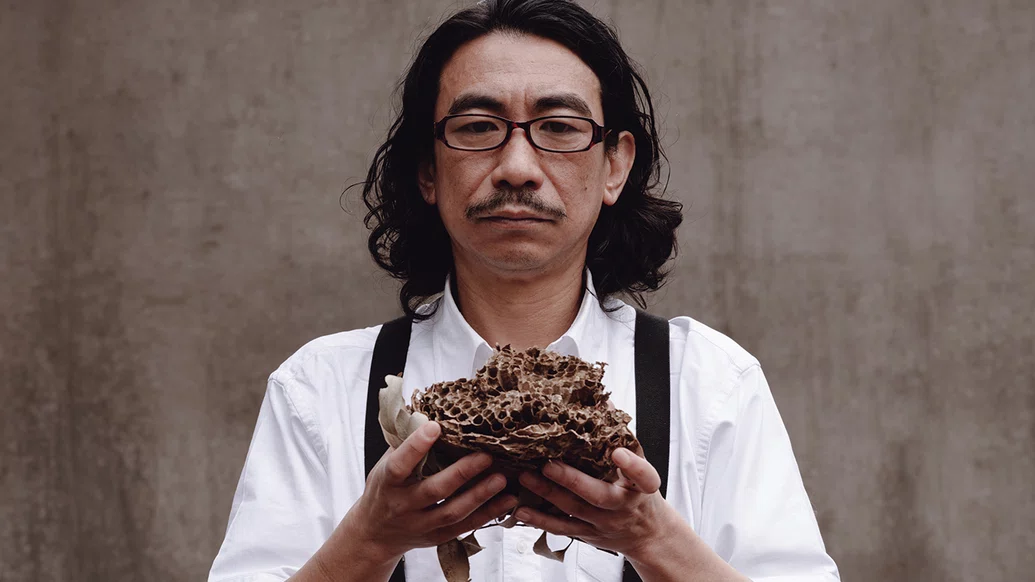
Of course, this doesn’t mean that Nobu has abandoned techno — far from it. In the same month that he debuted his blistering live set with Doltz, the fabric Originals label released his split single with fellow Japanese electronic innovator Wata Igarashi. Nobu’s contribution, ‘Flares’, is deceptively complex; its steady four-to-the-floor beat provides solid ground even as polyrhythmic synth arpeggios swirl overhead, resisting coalescence into any predictable pattern.
Igarashi’s track, ‘泡 (Abuku)’, is the perfect complement, beginning not with kicks but with a spectral ascending synth line that locks into an insistent groove. Where ‘Flare’ is heady, ‘泡 (Abuku)’ is all body. Released ahead of their B2B set at the London club in March, the single is the latest in the artists’ long-running collaborative relationship, which began in 2016 with Igarashi’s ‘Haziest just before the dawn’ EP on Bitta. “From a global perspective, the Japanese techno scene is quite small, so it was kind of natural for Wata and I to meet,” Nobu says. “I was honoured when he told me after our recent B2B that he enjoyed conversing with me through music.”
Nobu also hosts a regular night called Reprise at Tokyo’s WOMB club; the party also offers him another way to promote rising local talent, including the dubbed-out rhythms of ykah. As a senpai in the Japanese techno scene, he’s now in a position to offer wisdom to those carrying the torch. “If there is anything I can say to the younger generation, I would like them to value compassion for others, as the pursuit of quality in music is a given,” he says. “Whatever music I'm doing — dance music, hardcore, or whatever — I'm doing it with my own beliefs, and I want everyone to face music with that kind of enthusiasm. And of course, have fun while doing it.”
Promoter, producer, DJ and label head, it’s a wonder how Nobu manages to juggle his various roles while also modelling a path forward for others in his scene. But as he gears up for the road again, it’s his love for music that keeps this fire alive. “The one thing I always rely on is enjoying making sounds with instruments that bring out new ideas for my DJing or my production,” he says. “No matter how tired I am, coming into the studio and touching the instruments relaxes and soothes me.
“Creating something new through production is important, but on the other hand, having a conversation with music, enjoying that vibe, is what I’m focusing on at the moment. And that will affect my DJing in the future.”
Listen DJ Nobu's On Cue mix below.

